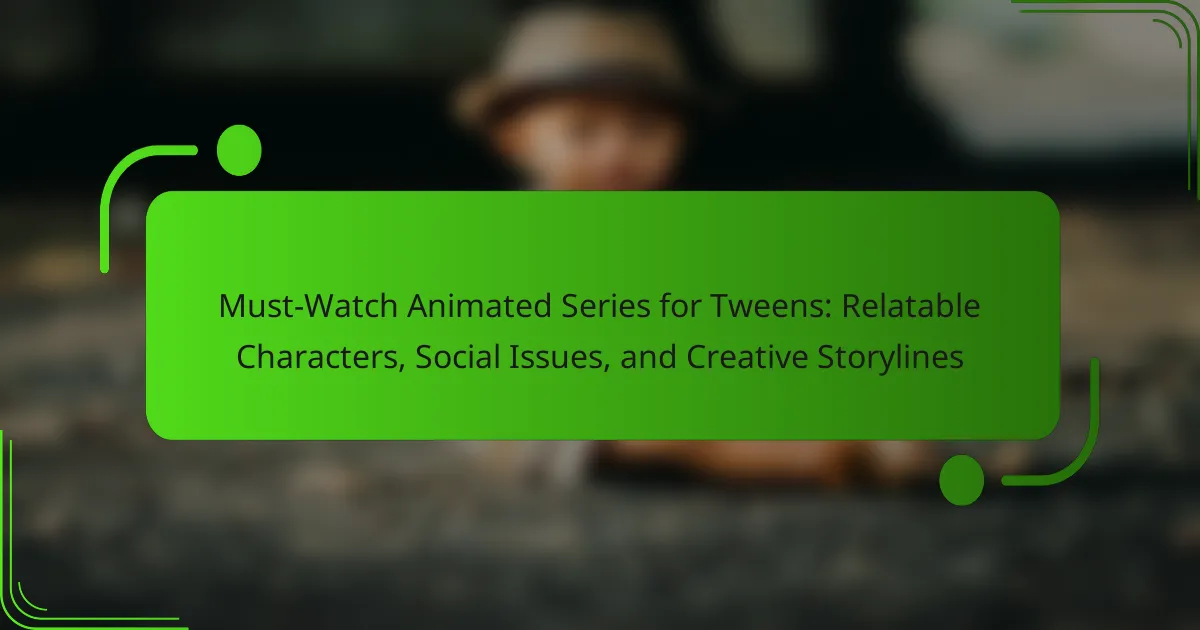This article focuses on must-watch animated series for tweens, highlighting five notable shows: “Avatar: The Last Airbender,” “Gravity Falls,” “Steven Universe,” “The Dragon Prince,” and “Big Mouth.” Each series is recognized for its engaging storytelling, character development, and ability to address social issues relevant to the tween audience, such as friendship, identity, and personal growth. The article explores how these narratives resonate with viewers by reflecting their experiences and challenges. Additionally, it discusses the importance of humor and relatable dialogue in fostering emotional development during this critical age. Overall, the content emphasizes the significance of representation and creative storylines in animated series for tweens.

What are the must-watch animated series for tweens?
The must-watch animated series for tweens include “Avatar: The Last Airbender,” “Gravity Falls,” “Steven Universe,” “The Dragon Prince,” and “Big Mouth.” “Avatar: The Last Airbender” is renowned for its deep storytelling and character development. “Gravity Falls” combines humor with mystery, appealing to a wide audience. “Steven Universe” addresses themes of identity and acceptance, resonating with many viewers. “The Dragon Prince” features rich world-building and diverse characters. “Big Mouth” tackles adolescent challenges with humor and honesty. Each series has received critical acclaim and has a strong following among tweens.
Why are animated series important for tweens?
Animated series are important for tweens because they provide relatable characters and address social issues. These shows often reflect the challenges and experiences that tweens face, fostering connection and understanding. They also promote emotional intelligence by exploring themes such as friendship, identity, and resilience. Research indicates that animated content can enhance cognitive development. According to a study by the American Academy of Pediatrics, watching age-appropriate animated series can improve problem-solving skills. Additionally, animated series often encourage creativity and imagination through unique storytelling and visuals. This combination of entertainment and education makes animated series a valuable resource for tweens.
How do animated series influence tweens’ development?
Animated series significantly influence tweens’ development by shaping their social skills and emotional understanding. These shows often present relatable characters who navigate challenges similar to those faced by tweens. This exposure helps tweens learn empathy and problem-solving skills. Research indicates that children who watch animated series that address social issues develop better social awareness. For instance, a study by the American Psychological Association found that media can impact children’s attitudes and behaviors. Animated series often incorporate lessons on friendship, diversity, and resilience. These themes encourage tweens to reflect on their own experiences and relationships. Overall, animated series serve as a valuable tool for social and emotional development during the tween years.
What skills can tweens learn from these series?
Tweens can learn critical thinking, empathy, and problem-solving skills from these animated series. These shows often present relatable characters facing challenges. Viewers analyze characters’ decisions and consequences. This analysis fosters critical thinking. Empathy is developed as tweens connect with diverse experiences. Understanding different perspectives enhances emotional intelligence. Problem-solving skills are honed through storylines that require creative solutions. Engaging with these narratives encourages tweens to think outside the box. Overall, these series provide a rich environment for skill development.
What themes are commonly explored in these animated series?
Common themes explored in animated series for tweens include friendship, identity, and personal growth. These series often depict characters navigating social challenges. They address issues like family dynamics and peer pressure. Many storylines emphasize the importance of teamwork and collaboration. Animated series frequently tackle themes of self-acceptance and resilience. They also explore cultural diversity and inclusion. Humor is often used to convey deeper messages. These themes resonate with tweens, making the content relatable and engaging.
How do relatable characters enhance the viewing experience?
Relatable characters enhance the viewing experience by fostering emotional connections with the audience. When viewers see themselves in characters, it increases engagement and investment in the story. This connection often leads to a deeper understanding of the characters’ struggles and triumphs. For instance, research shows that relatable characters can improve empathy and emotional intelligence among viewers. Studies indicate that audiences are more likely to remember and discuss stories featuring relatable characters. This can result in higher viewer retention rates and increased popularity of the series. Ultimately, relatable characters make narratives more impactful and memorable, enhancing the overall viewing experience.
What social issues are addressed through storytelling?
Storytelling addresses various social issues such as identity, diversity, mental health, and bullying. These narratives often reflect real-life challenges faced by individuals and communities. For example, stories about mental health can raise awareness and reduce stigma. Similarly, narratives showcasing diversity promote understanding and acceptance among different cultures. Bullying is frequently depicted in storytelling, helping to foster empathy and resilience in young audiences. Studies indicate that animated series for tweens effectively engage viewers with these themes, making complex issues more relatable and understandable.

What makes these animated series relatable for tweens?
Animated series are relatable for tweens due to their portrayal of real-life challenges. These series often feature characters facing social issues like friendship, identity, and family dynamics. The characters are typically designed to reflect the diverse experiences of tweens. This representation allows viewers to see themselves in the stories. Additionally, humor and relatable dialogue resonate with the tween audience. The storylines often include lessons about resilience and self-discovery. Research shows that relatable content helps in emotional development during this age. Tweens engage more deeply with narratives that mirror their own lives.
How do characters reflect the experiences of tweens?
Characters in animated series reflect the experiences of tweens by portraying relatable challenges and emotions. They often navigate issues such as friendship, identity, and peer pressure. These characters face dilemmas that resonate with the tween audience. For instance, shows like “Big Mouth” address puberty and self-discovery. Characters often experience conflicts that mirror real-life scenarios faced by tweens. This representation helps tweens feel understood and validated. Research indicates that relatable characters can enhance emotional engagement with the content. By reflecting real-life experiences, these characters foster discussions among tweens about their own lives.
What traits make characters relatable to young audiences?
Characters relatable to young audiences often exhibit traits such as authenticity, vulnerability, and growth. Authenticity allows characters to resonate with the experiences and emotions of young viewers. Vulnerability helps in showcasing struggles that many young people face, making characters more approachable. Growth reflects the journey of overcoming challenges, which is a common theme in youth development. These traits encourage empathy and connection. Studies show that relatable characters can significantly enhance engagement and emotional investment in narratives. For instance, research by the University of California found that viewers are more likely to connect with characters who display realistic emotions and challenges.
How do character arcs resonate with tween viewers?
Character arcs resonate with tween viewers by reflecting their own emotional and social growth. Tweens often experience significant changes in identity and relationships. Engaging character arcs provide relatable experiences that mirror these transitions. For example, characters overcoming challenges can inspire resilience in young viewers. Studies indicate that tweens connect with characters facing similar dilemmas, enhancing empathy and understanding. This connection fosters a sense of belonging and validation. Animation that showcases diverse character arcs allows tweens to explore various perspectives. Ultimately, these arcs contribute to the development of important social skills.
Why is representation important in animated series?
Representation is important in animated series because it fosters inclusivity and relatability. When diverse characters are portrayed, viewers can see themselves reflected in the stories. This representation helps to validate the experiences of underrepresented groups. According to a study by the Geena Davis Institute on Gender in Media, shows with diverse characters encourage empathy among audiences. Furthermore, representation can challenge stereotypes, leading to a broader understanding of different cultures and identities. Animated series that prioritize representation can positively impact children’s social development and acceptance of diversity.
How does diversity in characters impact tween viewers?
Diversity in characters positively impacts tween viewers by promoting inclusivity and representation. When tweens see characters from various backgrounds, they can relate to different experiences. This fosters empathy and understanding among peers. Research shows that diverse media can enhance social awareness in young audiences. A study by the Geena Davis Institute on Gender in Media found that representation influences children’s perceptions of gender roles and diversity. Additionally, exposure to diverse characters can reduce stereotypes and encourage acceptance. Overall, diverse characters enrich storytelling and resonate with a wider audience, benefiting tween viewers emotionally and socially.
What role do cultural backgrounds play in storytelling?
Cultural backgrounds significantly influence storytelling by shaping narratives, themes, and character development. They provide context that enriches the story. Different cultures bring unique perspectives, values, and traditions. These elements enhance the relatability of characters for diverse audiences. For example, stories rooted in specific cultural experiences resonate more deeply with individuals from those backgrounds. Research indicates that culturally diverse stories can foster empathy and understanding among viewers. This is particularly important in animated series for tweens, where relatable characters navigate social issues. Cultural backgrounds thus play a vital role in creating meaningful and impactful storytelling.

What are the creative storylines in these animated series?
Creative storylines in animated series for tweens often revolve around relatable characters facing social issues. These narratives explore themes such as friendship, identity, and personal growth. For example, “Steven Universe” delves into self-acceptance and emotional intelligence. “The Owl House” combines fantasy with themes of belonging and empowerment. “Avatar: The Last Airbender” presents a journey of redemption and the struggle between good and evil. Each series uses unique worlds and character arcs to address real-life challenges. These storylines resonate with tweens, making complex topics accessible and engaging.
How do unique storylines engage tween audiences?
Unique storylines engage tween audiences by offering fresh perspectives and relatable themes. These narratives often explore complex social issues that resonate with tweens. For example, animated series may address friendship, identity, and family dynamics. This relatability fosters emotional connections with the characters. Engaging plots also stimulate curiosity and encourage critical thinking. Research indicates that tweens are drawn to content that reflects their experiences. According to a study by the American Psychological Association, relatable storytelling can enhance viewer engagement and retention. Unique storylines thus play a crucial role in capturing the attention of tween audiences.
What elements contribute to compelling storytelling?
Compelling storytelling is driven by several key elements. Strong characters create emotional connections with the audience. A well-defined plot provides structure and direction. Engaging conflict introduces tension and stakes. Themes convey deeper meanings, resonating with viewers. Vivid settings enhance immersion and context. Effective pacing maintains interest and ensures proper development. Dialogue reveals character traits and advances the story. These elements are supported by successful examples in popular media, such as Pixar films, which consistently combine these components to captivate audiences.
How do plot twists and humor enhance the narrative?
Plot twists and humor enhance the narrative by adding surprise and engagement. Plot twists create unexpected turns that challenge audience expectations. This keeps viewers invested in the story. Humor provides relief and makes the content more relatable. It can highlight serious themes in a light-hearted way. Both elements increase emotional impact and memorability. For instance, animated series often use humor to address social issues, making them accessible to tweens. This combination enriches storytelling and fosters deeper connections with the audience.
What are some examples of standout animated series for tweens?
Some examples of standout animated series for tweens include “Gravity Falls,” “The Owl House,” and “Steven Universe.” “Gravity Falls” features twins uncovering supernatural mysteries. It has received critical acclaim for its storytelling and humor. “The Owl House” showcases a girl who discovers a magical world and embraces her identity. It has been praised for its representation and creativity. “Steven Universe” focuses on a young boy who learns about love and acceptance through adventures with magical gems. It is known for tackling complex themes and emotional depth. These series resonate with tweens due to their relatable characters and engaging narratives.
Which series have received critical acclaim?
“Avatar: The Last Airbender” is a series that has received critical acclaim. It is praised for its storytelling, character development, and thematic depth. The series has won numerous awards, including Annie Awards and a Peabody Award. “Gravity Falls” is another critically acclaimed series. It is recognized for its humor, mystery, and engaging narrative. The show received several awards, including a BAFTA Children’s Award. “Steven Universe” has also garnered significant acclaim. It is noted for its representation of diverse characters and complex themes. The series has won a GLAAD Media Award and an Emmy nomination. These series are often highlighted in discussions about impactful animated content for tweens.
What are the top-rated series among tweens today?
The top-rated series among tweens today include “The Owl House,” “Amphibia,” and “Gravity Falls.” “The Owl House” features a unique blend of fantasy and humor, captivating its audience. “Amphibia” combines adventure with relatable themes of friendship and growth. “Gravity Falls” remains popular for its mystery and engaging storytelling. These series resonate with tweens due to their relatable characters and creative narratives.
How can parents choose the right animated series for their tweens?
Parents can choose the right animated series for their tweens by considering age-appropriateness, themes, and character relatability. Age-appropriate content ensures that the material is suitable for their developmental stage. Parents should evaluate themes that resonate with their child’s interests and values. Relatable characters can enhance engagement and connection with the story. Research indicates that children benefit from shows that address social issues in a constructive manner. For example, series like “Avatar: The Last Airbender” tackle themes of friendship and responsibility. Parents should also read reviews and ratings to gauge the series’ reception among audiences. This approach helps ensure that the chosen series is both entertaining and educational.
What criteria should parents consider when selecting series?
Parents should consider age appropriateness when selecting series. Series should align with the developmental stage of the child. Content should be free from excessive violence, inappropriate language, or [censured] themes. Educational value is also important; series that promote learning can be beneficial. Parents should look for themes that encourage positive social interactions and problem-solving skills. Diverse representation in characters and stories can help children relate and understand different perspectives. Reviews and ratings from trusted sources can provide insights into the series’ suitability. Finally, parental controls can help manage viewing options effectively.
How can parents facilitate discussions about themes presented in the series?
Parents can facilitate discussions about themes presented in the series by engaging their children in open conversations. They should watch the series together to understand the context and themes. After viewing, parents can ask specific questions about the characters and situations. This encourages children to express their thoughts and feelings. Parents can relate the themes to real-life situations to make them more relevant. They can also provide examples from their own experiences to foster deeper understanding. Active listening is crucial; parents should validate their children’s perspectives. Utilizing discussion guides or resources related to the series can enhance the conversation. These strategies help create a safe space for meaningful dialogue.
The main entity of the article is animated series for tweens, highlighting their significance in addressing relatable characters, social issues, and creative storylines. The article outlines must-watch series such as “Avatar: The Last Airbender,” “Gravity Falls,” and “Steven Universe,” emphasizing their appeal through themes of friendship, identity, and personal growth. It discusses the developmental benefits of these series, including the enhancement of critical thinking, empathy, and social skills, while also examining the importance of representation and diversity in storytelling. Additionally, the article provides guidance for parents on selecting appropriate series and facilitating discussions about the themes presented.
